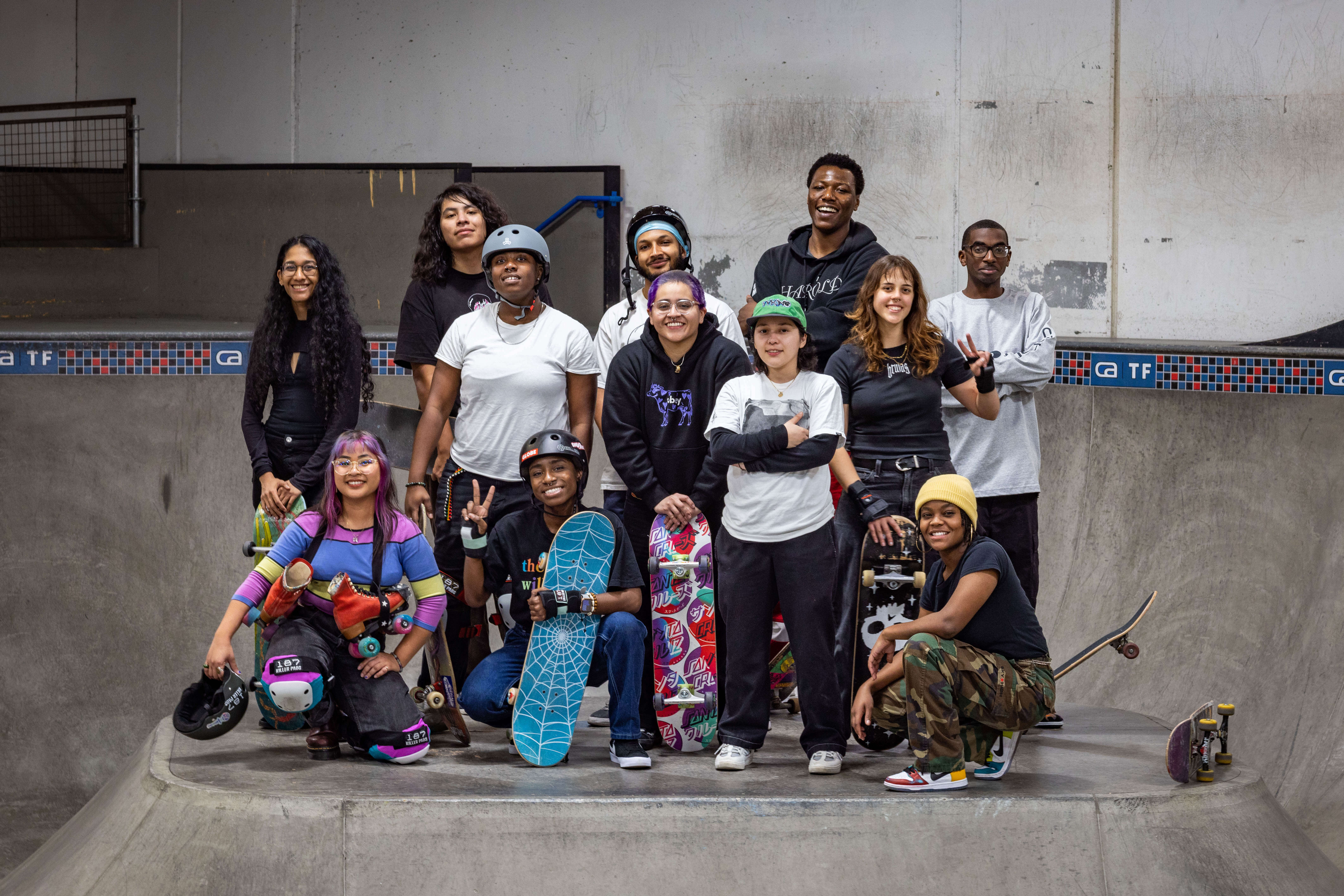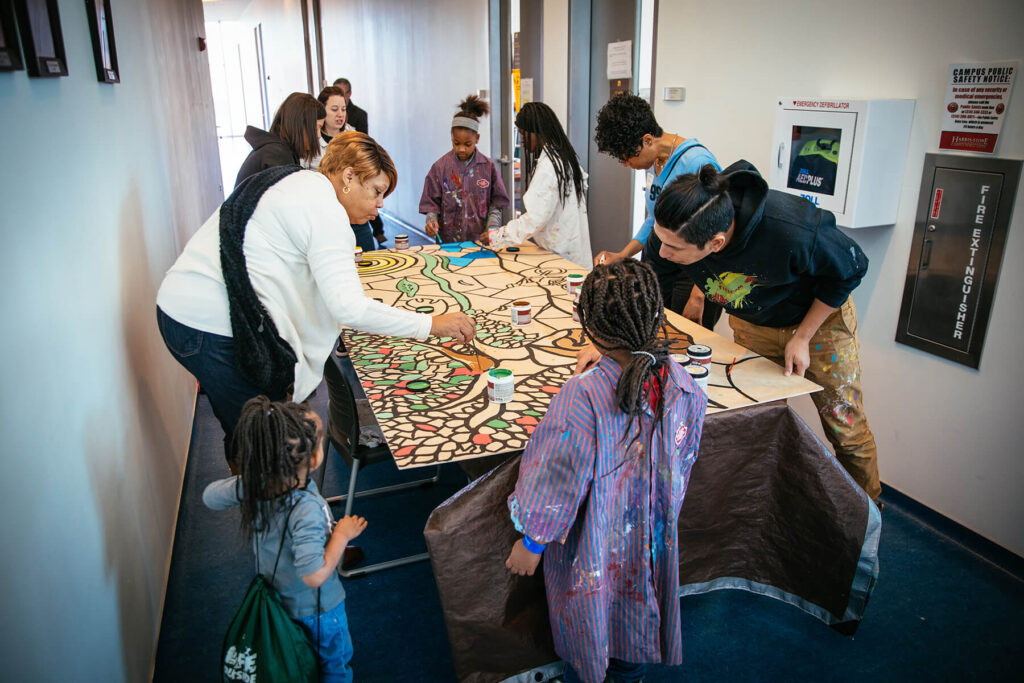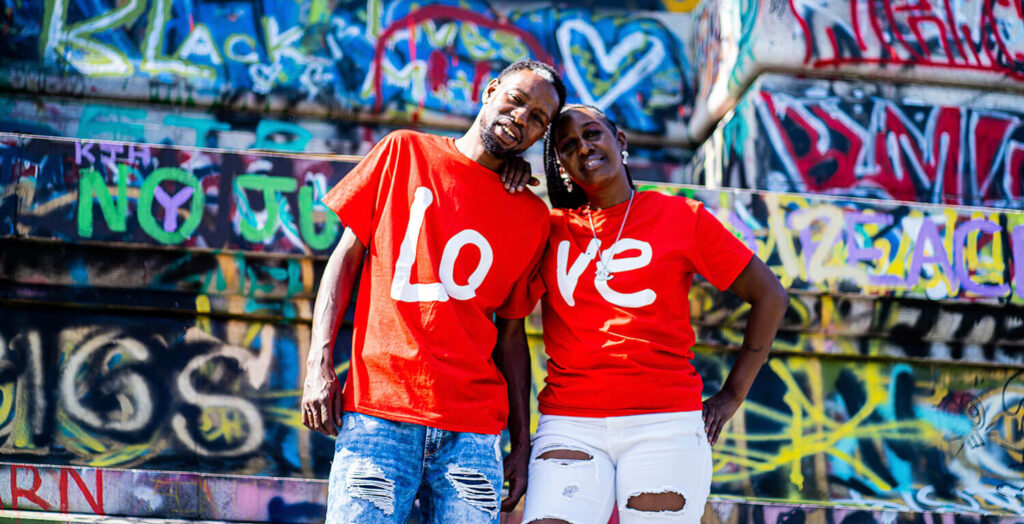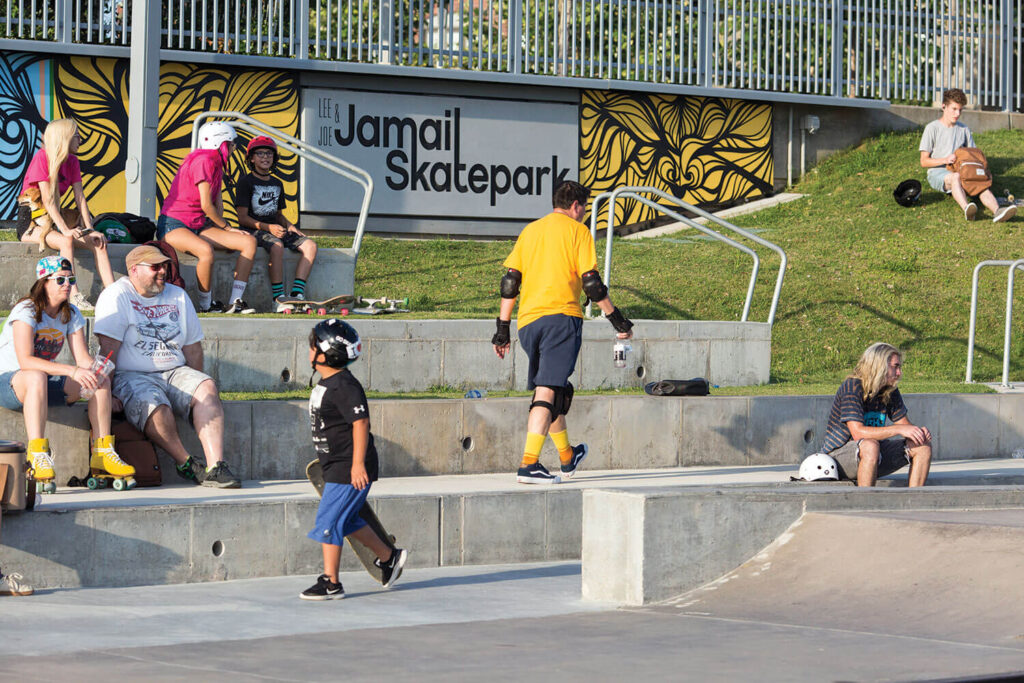Would you like to showcase your own work to embed equity in your infrastructure reuse project?
Skateparks can be Community Hubs too: How Young Leaders are Envisioning Change

Members of The Skatepark Project’s first youth fellowship program. Credit: The Skatepark Project
Cities have witnessed an explosive interest in skateboarding infrastructure in recent years. While many cities are ready to embrace this new type of public asset, much work is needed to maximize the benefits of skateparks in local communities. To address this, legendary skateboarder and entrepreneur Tony Hawk created a foundation in 2002, which was recently rebranded as The Skatepark Project.
The Skatepark Project (TSP) helps underserved communities create safe and inclusive public skateparks for youth. The organization favors projects that have strong community involvement, grassroots fundraising, and a base of support from skaters, parents, law enforcement, and local leaders. In the fall of 2022, TSP welcomed its first cohort of fellows for a twelve month advocacy training and design program for Black, Indigenous and People of Color (BIPOC) youth ages 18-24. The program empowers young adults who are passionate about the development of skateparks with skills to become creative civic leaders. At the end of the program, each fellow is awarded a development grant ranging from $10,000-$15,000 to invest in new skate infrastructure or supportive programming initiatives in their community.
How can TSP Fellows bridge the challenges they face and serve as agents of transformative change? In partnership with the High Line Network, this first cohort developed Theory of Change (ToC) statements, using the Network’s Community First Toolkit as a guide. The process of developing at ToC asks an organization to consider: what is our shared vision for advancing equity? What is most at stake for the communities we work with, and how can our work support those goals? By answering these questions, an organization or group of leaders can draft a ToC statement that can serve as a guiding star for equitable impacts. To expand leadership development, the High Line Network facilitated two workshops for TSP fellows, brainstorming how to elevate the impact skateparks and its users may have in their communities.
What are the challenges? First, TSP fellows identified problems or deficits that skatepark advocates currently face in their skate communities. They started with their hometowns, where they experience lack of representation, inaccessible equipment, and general scarcity of support and safety. Yet Fellows see the potential skateparks have as a key driver for social change, envisioning what skateparks could be and what kind of long-term impact they want. The fellows see skateparks as untapped public spaces that are well-suited for activities beyond the realm of recreation. They envision skate spaces as community hubs, where a range of resources are offered, from mutual aid services to free youth programming and wrap-around services.
Using the ToC framework, Fellows were asked to reflect on the current resources, or, “inputs,” at hand. For example, through their fellowship, they have access to what TSP has previously developed in support of skatepark advocates. This includes personalized mentorship and funding grants. Additionally, TSP has a ‘Resource’ section on its website, including the Skatepark Best Practices Guide, podcasts, and an app with skatepark data. Fellows shared a comprehensive list of current and aspirational local allies and partners. These range from grassroots collectives, neighborhood advocates, after school programs, artists, Boys and Girls Clubs, and city partners interested in supporting skatepark infrastructure in their hometowns.
In the workshop, TSP fellows were tasked with connecting these equity-driven “inputs” to value-based “outputs.” An organization’s “outputs” are the services and products they seek to provide. Fellows identified three outputs with equity in mind: 1) community-led campaigns; 2) programs and resources designed for minority groups and beginners; and 3) programs focused on intergenerational mentorship and workforce development.
A strong grasp on an organization’s “inputs” and “outputs” leads to equity-focused organizational outcomes. TSP fellows want to empower their home communities through programming designed by and for local communities. They want to develop spaces with accessibility standards in mind, lower existing barriers of entry, and increase opportunities for all-wheeled activities. Fellows envision stronger social cohesion with a focus on intergenerational community engagement and programming. Further, fellows see a potential for corporate social responsibility programs oriented towards workforce development and youth empowerment. Fellows ultimately agreed that skateparks are important catalysts for equity-driven economic development.
TSP Fellows understand change begins with high-quality skateparks, aligning with TSP’s mission. But these Fellows are thinking beyond the built environment. The change they envision focuses on transforming skateparks into community hubs with mutual aid services, and strategic partnerships. By the end of the workshop, HLN and TSP Fellows co-created an updated Theory of Change–shared below–which exemplifies their evolution in thinking about the organization and its potential impacts. As the fellowship comes to a close, what remains clear is TSP is sowing the seeds for this type of change to continue.
Skatepark Fellows’ Theory of Change
We want to increase access to all-wheeled activity, leveraging community-led programs, and building a network of mutual-aid services beyond skateboarding, where skatepark users can access services that directly contribute to their personal growth. Envisioning the restoration of the economic and social health of marginalized communities and providing free, recreational space for skaters of all ages & identities, we want to address the needs and ailments of under-resourced populations face from within, positively impacting youth mental and physical health alike.
Project Org
The Skatepark ProjectRelated Toolkit Section
Center EquityRelated Tool
CRAFT A THEORY OF CHANGECities have witnessed an explosive interest in skateboarding infrastructure in recent years. While many cities are ready to embrace this new type of public asset, much work is needed to maximize the benefits of skateparks in local communities. To address this, legendary skateboarder and entrepreneur Tony Hawk created a foundation in 2002, which was recently rebranded as The Skatepark Project.
The Skatepark Project (TSP) helps underserved communities create safe and inclusive public skateparks for youth. The organization favors projects that have strong community involvement, grassroots fundraising, and a base of support from skaters, parents, law enforcement, and local leaders. In the fall of 2022, TSP welcomed its first cohort of fellows for a twelve month advocacy training and design program for Black, Indigenous and People of Color (BIPOC) youth ages 18-24. The program empowers young adults who are passionate about the development of skateparks with skills to become creative civic leaders. At the end of the program, each fellow is awarded a development grant ranging from $10,000-$15,000 to invest in new skate infrastructure or supportive programming initiatives in their community.
How can TSP Fellows bridge the challenges they face and serve as agents of transformative change? In partnership with the High Line Network, this first cohort developed Theory of Change (ToC) statements, using the Network’s Community First Toolkit as a guide. The process of developing at ToC asks an organization to consider: what is our shared vision for advancing equity? What is most at stake for the communities we work with, and how can our work support those goals? By answering these questions, an organization or group of leaders can draft a ToC statement that can serve as a guiding star for equitable impacts. To expand leadership development, the High Line Network facilitated two workshops for TSP fellows, brainstorming how to elevate the impact skateparks and its users may have in their communities.
What are the challenges? First, TSP fellows identified problems or deficits that skatepark advocates currently face in their skate communities. They started with their hometowns, where they experience lack of representation, inaccessible equipment, and general scarcity of support and safety. Yet Fellows see the potential skateparks have as a key driver for social change, envisioning what skateparks could be and what kind of long-term impact they want. The fellows see skateparks as untapped public spaces that are well-suited for activities beyond the realm of recreation. They envision skate spaces as community hubs, where a range of resources are offered, from mutual aid services to free youth programming and wrap-around services.
Using the ToC framework, Fellows were asked to reflect on the current resources, or, “inputs,” at hand. For example, through their fellowship, they have access to what TSP has previously developed in support of skatepark advocates. This includes personalized mentorship and funding grants. Additionally, TSP has a ‘Resource’ section on its website, including the Skatepark Best Practices Guide, podcasts, and an app with skatepark data. Fellows shared a comprehensive list of current and aspirational local allies and partners. These range from grassroots collectives, neighborhood advocates, after school programs, artists, Boys and Girls Clubs, and city partners interested in supporting skatepark infrastructure in their hometowns.
In the workshop, TSP fellows were tasked with connecting these equity-driven “inputs” to value-based “outputs.” An organization’s “outputs” are the services and products they seek to provide. Fellows identified three outputs with equity in mind: 1) community-led campaigns; 2) programs and resources designed for minority groups and beginners; and 3) programs focused on intergenerational mentorship and workforce development.
A strong grasp on an organization’s “inputs” and “outputs” leads to equity-focused organizational outcomes. TSP fellows want to empower their home communities through programming designed by and for local communities. They want to develop spaces with accessibility standards in mind, lower existing barriers of entry, and increase opportunities for all-wheeled activities. Fellows envision stronger social cohesion with a focus on intergenerational community engagement and programming. Further, fellows see a potential for corporate social responsibility programs oriented towards workforce development and youth empowerment. Fellows ultimately agreed that skateparks are important catalysts for equity-driven economic development.
TSP Fellows understand change begins with high-quality skateparks, aligning with TSP’s mission. But these Fellows are thinking beyond the built environment. The change they envision focuses on transforming skateparks into community hubs with mutual aid services, and strategic partnerships. By the end of the workshop, HLN and TSP Fellows co-created an updated Theory of Change–shared below–which exemplifies their evolution in thinking about the organization and its potential impacts. As the fellowship comes to a close, what remains clear is TSP is sowing the seeds for this type of change to continue.
Skatepark Fellows’ Theory of Change
We want to increase access to all-wheeled activity, leveraging community-led programs, and building a network of mutual-aid services beyond skateboarding, where skatepark users can access services that directly contribute to their personal growth. Envisioning the restoration of the economic and social health of marginalized communities and providing free, recreational space for skaters of all ages & identities, we want to address the needs and ailments of under-resourced populations face from within, positively impacting youth mental and physical health alike.
Share this Case Study


